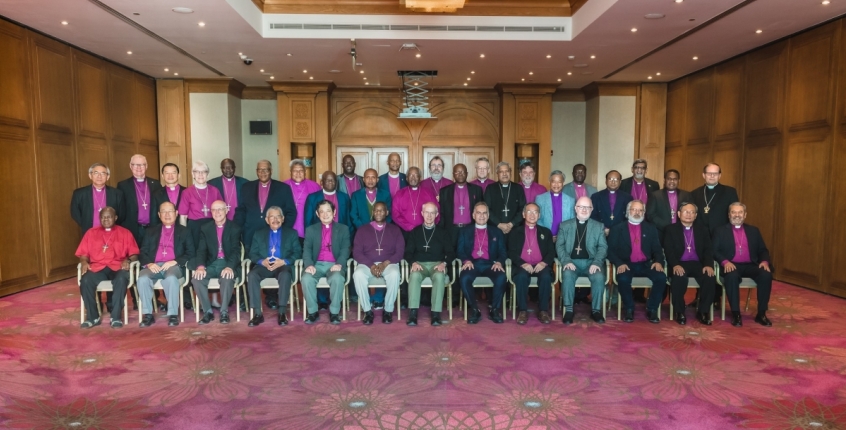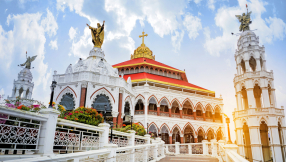
The Archbishop of Canterbury has said he hopes that the forthcoming Lambeth Conference will "draw a line under some of the inward-looking approaches of the past" so that the Anglican Communion can move on from a crippling dispute over human sexuality.
Speaking to reporters at the end of a three-day Primates' meeting in Jordan, the Most Rev Justin Welby said he wanted to see the Anglican Communion begin to focus instead "on those things that affect the world, be that climate change, conflict, the need for the Church to be confident in the Gospel of Jesus Christ, carrying it out into the world ... [and] safeguarding".
"We had really good, grown-up conversations about [these issues]," he said, adding that there was a need "to be honest about where we are, to come before God in Jesus Christ, in humility and repentence, for where we've failed to turn outwards".
Three primates, Henry Ndukuba of Nigeria, Stephen Kaziimba of Uganda, and Laurent Mbanda of Rwanda, declined the invitation from the Archbishop of Canterbury to join the meeting because of an ongoing disagreement within the Communion over how different views around human sexuality should be handled.
One of the purposes of the gathering in Jordan was to firm up plans for the Lambeth Conference taking place in Canterbury from July 23 to August 2.
The Lambeth Conference is held around once every decade and brings together bishops from across the Anglican Communion, and their spouses.
However, bishops from Kenya, Rwanda, Uganda and Nigeria have said they will boycott the gathering over the presence of gay bishops. They and other orthodox bishops are planning a separate meeting shortly before the Lambeth Conference.
The Archbishop of Canterbury has in the past appealed for them to participate, taking the step of barring the same-sex spouses of gay bishops from attending the Conference.
He said he was "very sad" that three primates had chosen not to attend this week's meeting in Jordan.
Reflecting on the discussions, he said it had been one of the "most constructive and creative" Primates' Meetings he had attended.
"There's been a real sense of the presence of God, the Spirit of God in the meeting as we've gone through some of the obvious difficult issues that arise when you have people representing provinces that cover 165 countries and 2,000 languages or more," he said.
"There's been a real sense of people seeking to walk together, to build the life of the Church and to look outwards."
Michael Lewis, Primate of Jerusalem and the Middle East, agreed with the Archbishop, saying that there had been "grown-up" conversations during the meeting.
"People have spoken from the heart and they've spoken from the head, and I feel really bouyed up," he said.
A communiqué issued at the end of the Primates' Meeting spoke of a desire for unity.
"As we gathered as Primates we were acutely aware of the ongoing tensions within the Anglican Communion. However, we were also profoundly conscious of the Holy Spirit in our midst, drawing us to walk together," the Primates said.
They recommended that a group be appointed to continue "to explore how we live and work together in the light of the Lambeth Conference".
The communiqué touched on other areas of discussion during the Jordan gathering, including the "acute concern" of safeguarding children and vulnerable adults in churches.
"The fact of past and present abuse is a matter of lasting pain and regret," they said.
"We repent of those times when the Church is and has been culpable and has failed to protect those entrusted to the Church's care.
"We reaffirm our commitment to listen to and to work with all survivors of abuse and our determination to provide a safe environment in our churches."
Reflecting on environmental concerns, they said that "climate change is not a future threat but, for many in the world today, a present, lived reality".
The comuniqué also expressed concerns over places experiencing conflict, natural disaster or unrest, like Sudan and South Sudan, Hong Kong, the Democratic Republic of Congo, Bolivia, Chile and Australia.
"When we come together from around the world we bring our varied situations with us and are able to share, and pray for, the countries and churches from which we come," they said.
"In various parts of the world Christians face great pressure that makes Christian life and ministry difficult and, sometimes, unbearable.
"We are, as a body, strengthened by the resilience and faithfulness of these, our brothers and sisters."













